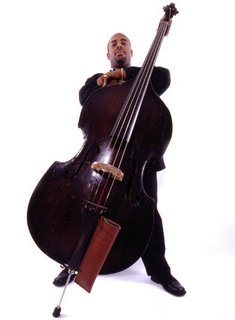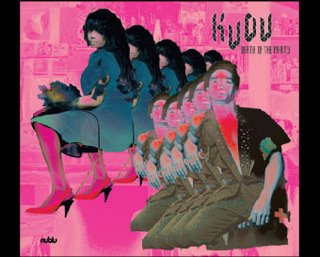 Geri Allen the Gathering
Geri Allen the GatheringVerve 1998
Produced by Teo Macero, with Geri Allen and Herb Jordan
Performers:
Geri Allen - piano
Wallace Roney - trumpet
Robin Eubanks - trombone
Dwight Andrews - reeds
Vernon Reid - acoustic and electric guitars
Ralphe Armstrong - 7 string bass
Buster Williams - bass
Lenny White - drums
Mino Cinelu - percussion
When I first got word that Geri Allen had assembled this stacked line up for her then upcoming album, I was very curious as to what exactly was going to happen. Was she going to shoot into a fusion throwback phase? Was she going to play it safe with unsafe players? Was she going to try a multitude of disparate things with little commonality?
I was mostly wrong on all counts.
This album is very accessible, even inviting, but it takes risks. It has variety, but does not lack any coherence. This album is electric in persona, but the often maligned f-word (fusion) is not really applicable. What it is goes beyond the standard post-bop fare and is a self-contained moody, pensive work.
Allen has always been a diverse player, able to traverse styles and approaches with a deftness few can match. Her more abstract work has certain parallels to Keith Jarrett and Don Pullen, but on this there is strong hints of Herbie Hancock's lyricism and the sense of space that reminds me of Bill Evans at his best. It's cerebral, but not clinical.
The opener starts with a stalking piano motif and a percussive undercurrent by White and Cinelu, and flows with the unison lines of the brass. If anyone has an intuitive manner around Allen's material it is her husband, Wallace Roney. He shines in several spots, but most notably on
Baby's Breath, which has an almost processional quality to it and his tone generates a warm heat throughout. The surprise player on this outing is Reid, who while already well known for the versatility of his electric playing, here mostly plays acoustic, and is practically a whole other musician altogether (not too dissimilar in the way Wayne Shorter seems to have two different playing approaches between Tenor and Soprano saxes), eschewing some of his trademark pyrotechnics, effects laden voicings and funky angularity to a crisp, unadorned tone. His phrasing hints at some of his speed and dexterity, but it is mostly in interplay with Allen, when she takes the charge. This is evident on
Ray and
Joy & Wonder, where at times Reid seems to be evoking Bill Frisell and
Steve Tibbets at the same time. The sole electric pass is in the Miles Davis tribute,
Dark Prince, which slaps bop and early fusion together in a fun, freewheeling romp. To anyone who knows the work of Lenny White, knows he was meant to play on this kind of record. White is versatile and has a deft set of hands; moving from propulsive and bearing down hard on the pulse, to slipping into delicate passages at will (his brushwork is always good).
Allen has often worked in trios, and the format is an excellent one for her, as it gives her ample space to play in. Many of the better tracks here follow that;
Ray (piano, guitar, percussion),
Soul Heir and
Light Matter (piano, bass, drums) most notably. The larger line ups work very well, but the focus is on ensemble playing, whereas if you want to get your Allen-on, the smaller line ups make for more solo heat.
Keeping all this together and cogent at the mixing desk is the legendary Teo Macero, and he makes the whole recording have a fullness and earthy, haunting quality suited to the material. No filler, all killer.
This should have made anyones top jazz albums of the 90s, and is well worth seeking out for both the post-bop n00b as well as someone looking to expand their horizons.
 Oh boy, where to start. I bought this on a whim back when it came out. I had money burning a hole in my pocket and this album by Scandanavian one-shot group Time Gallery was produced by Keith Olsen (whose work with various artists like Saga, Pat Benetar and Santana I dug). How bad could it be?
Oh boy, where to start. I bought this on a whim back when it came out. I had money burning a hole in my pocket and this album by Scandanavian one-shot group Time Gallery was produced by Keith Olsen (whose work with various artists like Saga, Pat Benetar and Santana I dug). How bad could it be?











